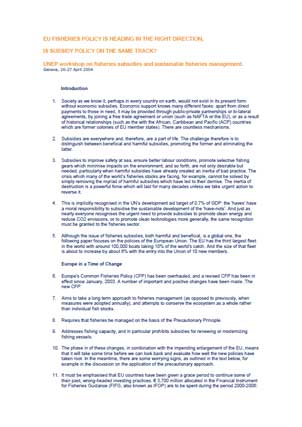Report | May, 2010
UNEP workshop on fisheries subsidies and sustainable fisheries management
Society as we know it, perhaps in every country on earth, would not exist in its present form without economic subsidies. Economic support knows many different faces: apart from direct payments to those in need, it may be provided through public-private partnerships or bi-lateral agreements, by joining a free trade agreement or union (such as NAFTA or the EU), or as a result of historical relationships (such as the with the African, Caribbean and Pacific (ACP) countries which are former colonies of EU member states). There are countless mechanisms.
Subsidies are everywhere and, therefore, are a part of life. The challenge therefore is to distinguish between beneficial and harmful subsidies, promoting the former and eliminating the latter.
Subsidies to improve safety at sea, ensure better labour conditions, promote selective fishing gears which minimise impacts on the environment, and so forth, are not only desirable but needed, particularly when harmful subsidies have already created an inertia of bad practice. The crisis which many of the world’s fisheries stocks are facing, for example, cannot be solved by simply removing the myriad of harmful subsidies which have led to their demise. The inertia of destruction is a powerful force which will last for many decades unless we take urgent action to reverse it.
This is implicitly recognised in the UN’s development aid target of 0.7% of GDP: the ‘haves’ have a moral responsibility to subsidise the sustainable development of the ‘have-nots’. And just as nearly everyone recognises the urgent need to provide subsidies to promote clean energy and reduce CO2 emissions, or to promote clean technologies more generally, the same recognition must be granted to the fisheries sector.
Although the issue of fisheries subsidies, both harmful and beneficial, is a global one, the following paper focuses on the policies of the European Union. The EU has the third largest fleet in the world with around 100,000 boats taking 10% of the world’s catch. And the size of that fleet is about to increase by about 6% with the entry into the Union of 10 new members.




